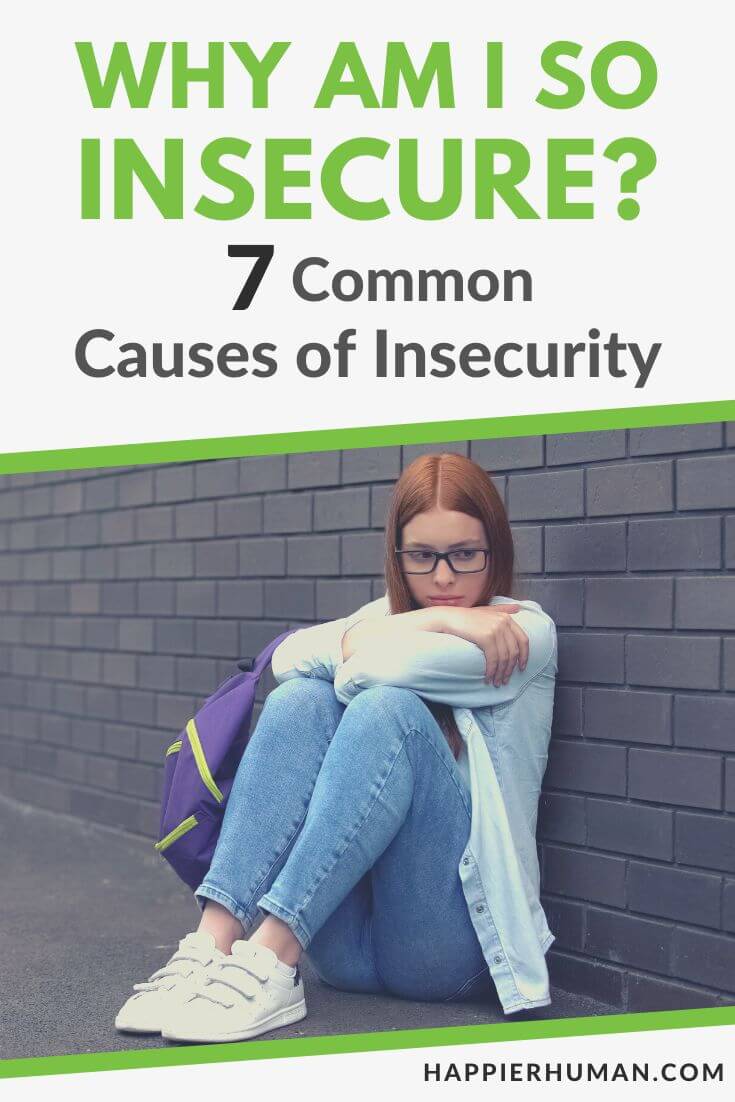Let me guess, you find yourself often asking the question, “Why can I not do anything right?” Maybe you don't like what you see in the mirror and feel others aren't impressed either. Or perhaps you’re a perfectionist? I know how it feels to have low self-esteem and live daily with insecurities.
There are several causes of insecurities. However, by identifying your insecurities and facing them head-on, you can minimize the negative impact they can have on you.
What does it mean to be insecure?
To be insecure is to be overall uncertain, have great anxiety, and lack self-confidence. When a person is insecure, they doubt their self-worth, skills, abilities, and overall value. Some are even insecure to the point of believing they are a detriment to others.
Furthermore, insecurity has an emotional, mental, and physical impact on you. A few symptoms of someone being insecure are:
There are also many forms of insecurities that many of us deal with. They can have many different origins and effects on our lives. They may stem from past trauma, an abusive parent, or an abusive relationship. But, no matter how it started, it is all rooted in fear, shaped by those past experiences.

Feelings that you are inadequate may have started in childhood, but usually carry over into adulthood, influencing our self-perception and the way we interact with those around us. Self-esteem comes from how we handle those past relationships and the world surrounding us. Therefore, perception matters more than the reality of a situation.
Insecure people can be anxious and uneasy in their perception of the world. So don’t try to hide your insecurities but seek to overcome them. Here are a few insecurities to look out for.
Social Insecurities
Social insecurities are a lack of confidence that one will do well in social settings. In addition, social insecurity comes from fear of how the future will turn out for a person rather than what happened in the past.
People with social insecurity may worry that:
Relationship Insecurities
An insecure person with relationship insecurities is unwilling to be vulnerable and trust others. They simply don't believe a person will follow through on their promises and behave as they are expected to.
Trust issues affect the insecure person and anyone they are in a relationship with. Lastly, they can also be clingy, begging for your attention and reassurance at every turn.
Insecurities of Basic Needs
It is hard to succeed in life without having adequate housing, health, or enough food. Not knowing where your next meal is coming from, where they will sleep at night, or concerns about your mental or physical health zaps your energy and focus from other matters in life. This creates physical and psychological hardships.
Insecurities about Body Image
Those with insecurities about their body image wrestle with the ability to accurately see their physical appearance objectively. Consequently, they begin spending much time and energy concerned about their appearance.
This insecurity can even be targeted to a specific body part such as one's legs, teeth, knees, ears, or nose. Furthermore, this insecurity can stem from judgment from others, but the judgment they place upon themselves is much harsher.
Career Insecurities
Career/Job insecurities come from someone who feels incompetent in the workplace. If you have career insecurities, you may feel overwhelmed with uncertainty concerning your job, you feel like a fraud, you're confused, hesitant to make decisions, and overwhelmed with feelings of doubt.

Similar to career and job insecurities, students in school experience the same type of insecurity. This comes when questioning their intelligence and ability to perform assignments and apply the knowledge they have been given in the classroom.
In both career and classroom insecurities, people fear their abilities and leave tasks unfinished because they fail to try.
The Effects of Insecurity
Here are some of the most notable effects of being insecure:
7 Common Causes of Insecurities
A person's insecurities can be brought on by their life experiences. It can also be an inherited biological trait passed down from generation to generation, showing through a person's personality and temperament.
Though experts cannot completely understand the origins of insecurities, there are connections associated with many causes.
1. Lack of Emotional Support
Many of you deal with insecurities because you did not have family members who were loving and supportive of you. Furthermore, insecurities can exist because of the standards set by people we interact with.
If they tend to be judgmental, it can cause us to be insecure within ourselves, hoping we will not become judged by them too.
2. Lack of Emotional Intelligence
Insecure people may be that way because of low emotional intelligence. They cannot correctly monitor their feelings and others around them. This leads to a lack of trust and unhealthy relationships.
3. Unfulfilled Needs
Many are dealing with insecurities because they have experienced a lack of their basic necessities such as food, clothing, shelter, and security. This causes a psychological struggle to find safety and satisfaction because of past circumstances.
4. Lack of Openness and Acceptance
Insecurities can stem from a lack of acceptance and openness toward others. When this occurs, you aren't comfortable with new people and situations.
Furthermore, there isn't even much curiosity but more fear and stress about how others perceive you. It doesn't allow an insecure person to let their guards down.
5. Interpersonal Conflicts
Interpersonal conflict can cause a person to be insecure. They tend to be less agreeable and are not very helpful, emphatic, or supportive. Being in social situations may cause an insecure person to feel even less secure.
6. Finding Significance in the Wrong Things
Many are insecure because they seek security in the wrong things. In addition, they have unhealthy attachments to their children, spouses, careers, gifts, talents, material possessions, and how they appear to others.

None of which can truly satisfy us or make us secure. If a person loses one of those things, it could cause insecurities to set in considerably.
7. Tragic Circumstances and Abuse
Whether it was a death to someone you were close to, infidelity in a marriage, a loving relationship, or physical or emotional abuse, they can cause a person to be insecure.
Unfortunately, placing security in others can set us up for failure. It is so cliché to tell others that we will “always” be there for them, but in reality, that is simply impossible. Things happen in life, whether sickness or death, and it is not wise to completely place our security in people. But, realistically, almost all of us do it anyway.
Infidelity can cause a person to feel “less than enough” and lack the confidence and security to move forward.
Furthermore, insecurity can be a result of abuse. Emotional abuse can come in many forms. It comes from people who have been overly criticized, and their self-worth attacked.
Moreover, it can come because of a partner who has attempted to control your appearance, gaslights you, shuts down conversations you try to have, monitors your activities, and isolates you from others.
Steps to Overcoming Insecurity
Overcoming insecurities can be difficult. However, it is not impossible. Here are a few things you can do to overcome insecurities.
Final Thoughts on the 7 Common Causes of Insecurity
Most people who are feeling insecure don’t want anyone to know about it. Yet, there is power in sharing your feelings with someone you trust and getting help to overcome it.
Insecurities can come from many circumstances – such as poor academic scores, stressful life experiences, abusive relationships, chronic health conditions and mental issues, among others. But these past circumstances don't have to rob you of your present… nor do they have to create anxiety concerning the future.
Insecurity is common among most people; however, it should not get to the point where it is taking control of your life and your decisions… disrupting your relationships and day-to-day activities. In that case, there is help available for you. Talk to a friend or family member, or seek a therapist, who can help you take your life back.


